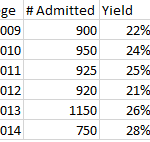Word of Mouth breeds knowledge (and knowledge is POWER).
I know, I know, you get what you pay for. But word-of-mouth is invaluable in both preparing for College and The College Search, in the same way that this website is valuable to students and parents, because you are getting advice from a parent who has recently helped their child in The College Search and who understands the need for specific, organized, pertinent information about The Search. Effective word-of-mouth, by my definition, means that people are sharing information they think is valuable to each other. Word-of-mouth information can be inaccurate or incomplete, but it often provides a bigger picture, and a different perspective.
Do you need examples?
1. My kid wants to take a class not offered at her school (Advanced French, for example), and is debating whether to take that class at another High School, a Community College or on-line. She asks her counselor, who suggests she take the class on-line, because its hard to line up her class schedule at her High School with when that class is offered at another High School or Community College. She is proactive, and asks a few friends who have taken off-campus courses for advice. One of them warns her that their school allows only 2 classes be taken on-line. My kid wanted to take Health and Creative Writing through on-line courses, and realizes that if she takes Advanced French on-line, that will preclude her plans for Health and Creative Writing. She can now make a more informed decision, some of that information coming from word-of-mouth, which is more complete information than she discovered merely by talking to her counselor.
2. A Senior in High School is debating whether to apply to a “reach” school, thinking it’s unlikely he will be accepted. He mentions this school to a friend, who happens to be friends with a College Junior (Sherry) attending that College. This friend tells him that Sherry struggled with her grades when she attended their same High School. He mentions this news to a teacher, who knows Sherry. The teacher offers to connect the students over Skype. During their discussion, Sherry admits that she did not have a great cumulative GPA due to some missteps early in her High School years, which makes the boy hopeful, as his GPA is also not stellar. She said that based on conversations with the school and her classmates after she attended the College, she understood more about what got her “in”: a) the College valued that she got consistently better grades starting her Junior year, b) she had spectacular test scores, and c) the school emphasizes sports, and she was a star varsity volleyball player. At this point, he feels less hopeful, as he has not been successful in raising his grades his Junior and Senior years, his test scores are average and he doesn’t play a sport. Can he find more information that might might make him think he can get in? Yes, but he knows a lot more after the conversation with Sherry than if he had only been told that there’s a kid from their high school who wasn’t a great student that got in. That doesn’t mean he can’t apply, but now he knows his chances of acceptance are not high. Maybe that conversation gets him thinking about how Sherry’s talents helped her gain acceptance, and that he should look for another desirable “reach” school that emphasizes music, because he was a finalist in the State Competition, playing the oboe. Knowledge is power!
The key to word-of-mouth is you have to be talking to someone who has experienced the same issue or know someone who has, and that this person became very knowledgeable about that issue. That is why a College Counselor can be invaluable, because they know the intimate details of many students’ experiences, and therefore will be more likely to provide relevant information. But even their experiences are limited, so you should still be trying to procure word-of-mouth information, censoring it for inaccuracies. Seek knowledge through many resources, but don’t discount the value of word-of-mouth.
When I am with a group of parents with High-School aged children, it is invariable that a discussion about Colleges results. These can be GREAT discussions, because someone is sharing a story or insight, and if there are others in the group with similar experiences, they can elaborate or disagree, based on their knowledge. That story leads to more questions, and I am leaving that gathering with new things to think about.
Word-of-Mouth Breeds Success
Another reason to get in the habit of promoting these discussions? Most people agree that success in life often comes from who you know. But you need to FIGURE OUT who you know. Do you know where your friends went to College? Their current employer and position, as well as previous employer and positions? Where they used to live? Their sports and favorite past-times? Knowing who you know means you can take advantage of their experiences when the need arises.
If you are a connector, or know a connector, good things result.
A connector knows about their friends, co-workers, etc. and connects people. If their cousin wants to be a Financial Advisor, they connect her with their son’s best friend’s father, who is a Financial Advisor. When their babysitter is moving to Oregon for a position at Nike, they connect him to their co-worker, who used to live in Oregon and has friends who work at Nike.
Word-of-Mouth can be awesome!






